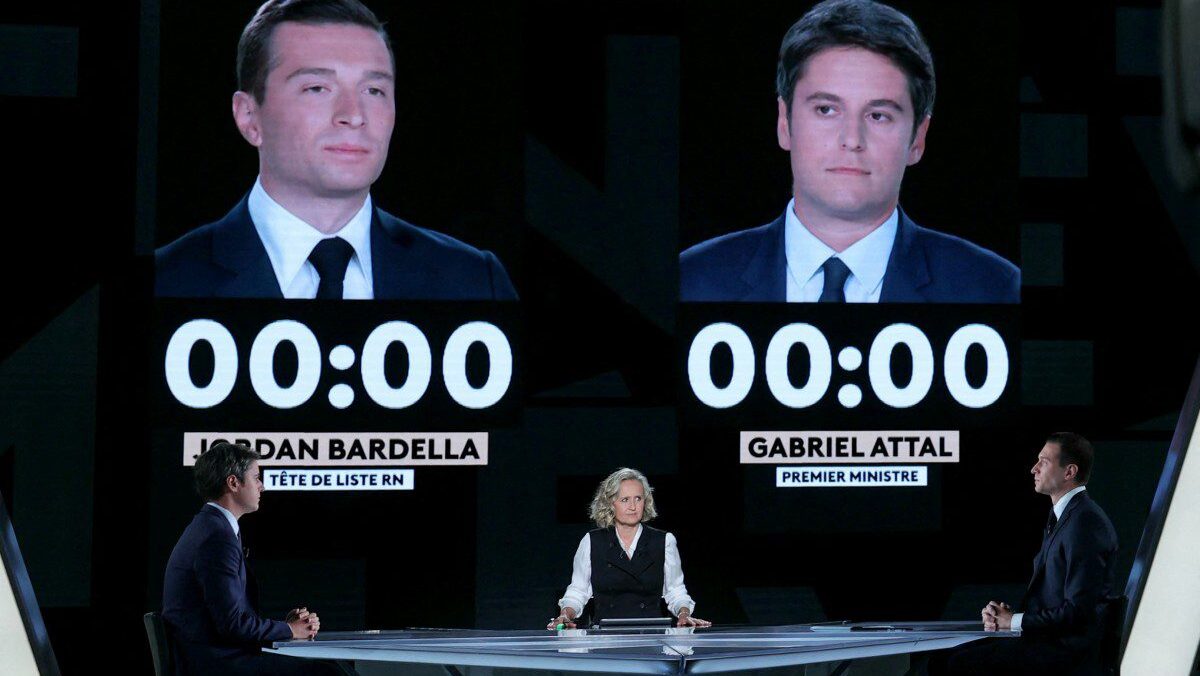
French Rassemblement National (RN) party president and leading candidate for the June 9 European union election Jordan Bardella (L) and Prime Minister Gabriel Attal attend a debate hosted by French journalist Caroline Roux at French state-owned TV channel France 2, on May 23, 2024 in Aubervilliers, near Paris.
Photo: Thomas SAMSON / POOL / AFP
A debate on French public television on Thursday, May 23rd pitted Jordan Bardella, head of the national conservative Rassemblement National list for the European elections, against Prime Minister Gabriel Attal. The confrontation, which had the flavour of a repeat of the clash between Marine Le Pen and Emmanuel Macron in the presidential elections of 2017 and 2022, was the subject of much comment, often circumspect. While neither man emerged the big winner from the confrontation, it did confirm the two men’s now inescapable positions on the French political scene.
The principle of the discussion, broadcast during prime time, was questionable: the floor was taken by two personalities who were not on the same level—a list leader and party leader, on the one hand, and the head of government, on the other. The second half of the evening left crumbs of speaking time to a selection of other candidates, on the Left, with La France Insoumise and the Greens, and on the Right, with Les Républicains and Reconquête.
The leader of Rassemblement National is still riding high in the polls, which regularly put him above the 30% mark. However, according to many observers, including on the Right, his performance was ambivalent, sometimes lacking confidence on key issues, such as when Prime Minister Gabriel Attal tried to destabilise him on the hackneyed subject of links between the Rassemblement National and Russia.
It would seem that the young politician has taken on board a little too much of the codes already used by Marine Le Pen in her previous exchanges with the head of state: refusing to be provocative and smoothing out the discourse, at the cost of watering it down, as summarised by journalist Marc Eynaud for Valeurs Actuelles: “How to de-demonise without drowning. How to divide without fracturing. How to bring people together without diluting.”
The RN candidate has also been weakened by the changes in his party’s line identified in recent years, which Attal was quick to point out: “The RN’s method is to say ‘we’re against everything, and then in five or ten years, if we realise we’ve screwed up, we’ll say we’ve changed our mind.’ What made you change your mind on the euro, on Europe, on the European electricity market?” he criticised. Bardella was quick to castigate, for his part, “the Macronist talent of the prime minister to be able to say everything and the opposite of everything, each time with the feeling of being right.”
In Bardella’s favour was the smugness of a prime minister asserting technocratic truths that stretched credulity, while the RN candidate retained the ability to connect his discourse to what his electorate really want, on immigration or insecurity.
The conclusion of Attal’s speech was quite emblematic of his character: an assertive ideological plea for the “Europe of the Enlightenment,” and a promotion of societal ‘advances’—abortion, LGBT rights.
The duel between the two men reveals a decline in the quality of public debate in France. The level of language was extremely low, with the Prime Minister making one gross French mistake after another. The immaturity of both men showed them to be short-sighted and lacking in inspiration and vision.
The second half of the evening saw the other two right-wing candidates set out their European programmes face-to-face with journalists. Les Républicains candidate François-Xavier Bellamy was indignant at the premium given to the RN and Emmanuel Macron’s party in a mock presidential debate, described as artificially “staged”—a view welcomed by colleagues from his party, Les Républicains, but also by the Communists.
The speech by Marion Maréchal, head of the Reconquête party list, took a divisive approach by explicitly stating that she was in favour of “remigration”—understood in this case as the return of foreign criminals present on French soil to their country of origin. There was also a contrast with the RN’s discourse on the importance of a civilised Europe: “We need less of this Europe of Brussels and more of a Europe of civilisation whose compass is the pride, transmission and prosperity of our civilisation”, she said.
Another debate is scheduled for June 4th, this time between all the front-runners. But are we still in an era when this kind of discussion can turn the tide? Never before have votes been so strongly determined by emotional motivations, over which television verbiage has little influence.
